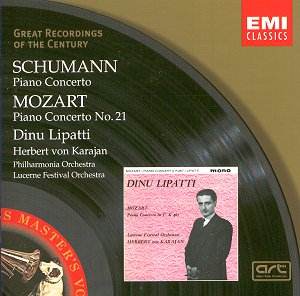Dinu Lipatti's renowned recording of the Schumann Piano
Concerto makes a welcome reappearance in the distinguished ranks of
EMI's 'Great Recordings of the Century' series. And well it might, for
despite the obvious drawback of fifty-year-old sound there is indeed
something special about it.
Illness brought the pianist's early death in 1950,
just weeks after he had performed the Mozart C major Concerto at the
Lucerne Festival, again with Karajan conducting. If the recorded sound
of this live performance does not have the advantages of the occasional
studio retake, there is the frisson of a special occasion running through
every bar. In his excellent insert notes Richard Osborne mentions that
the audience was aware of Lipatti's circumstances - he was by now mortally
ill - and the reception they give the performance is nothing less than
ecstatic.
A particularly interesting aspect of the Mozart performance
is that Lipatti plays his own cadenzas. Since these are not widely available
in printed form this recording does a service in bringing them to a
wider public. They are well worth hearing too, inventive and appropriately
judged. The same might also be said of the performance itself. The Lucerne
orchestra is good enough, though not in the same league as the post-war
Philharmonia (but then who was?). Conductor and pianist worked again
and the music gains from their close liaison. Mozart's concertos are
miracles of subtle interplay and the balances are beautifully made.
There is a compelling intensity and sense of occasion which soon makes
the dim sound recede in the listener's consciousness.
The Schumann is the better known of these performances,
of course. In his notes Osborne refers to Lipatti confessing that he
did not 'count on an unexpected factor, a remarkable but super-classical
conductor who, instead of helping my timid romantic plans, put a break
on my good intentions'. In fact this tension is rather effective tightening
the music's drama and making the most of its range. There is always
a special balance of classicism and romanticism in Schumann, as there
is also in Mendelssohn and Berlioz, to name two of his contemporaries.
So this approach of different views coming together is not at all inappropriate,
since it is one of the contributory factors in the legendary status
both pianist and performance have achieved.
Terry Barfoot


![]() See
what else is on offer
See
what else is on offer 